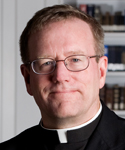December 20, 2009
Don’t panic when world and everything in it is shaken

Faith
and Culture
Perhaps some of you were taken aback when you heard the Gospel reading for the first Sunday of Advent. It is a speech of Jesus reported in the 21st chapter of Luke’s Gospel and it contains some of the most startling things that the Lord ever said. “There will be,” Jesus asserted, “signs in the sun, the moon, and the stars, and on earth nations will be in dismay … people will die of fright in anticipation of what is coming upon the world, for the powers of the heavens will be shaken.”
This kind of language was fairly familiar to Jesus’ hearers, for it hearkened back to the book of the prophet Daniel. That Old Testament prophet had also spoken of a violent “tribulation” that would presage the end of the universe. Both Daniel and Jesus evoke a sort of reversal of Eden.
In the beginning, the Bible says, God created the heavens and earth, placing the sun, moon and stars in the sky and separating the earth from the sea and ensconcing our first parents in a peaceful garden. But at the end of all things, Jesus and Daniel seem to say, the ordered world — in both its natural and political expressions — will revert to chaos. But then, precisely when everything seems lost, “men will see the Son of Man coming on the clouds with great power and glory.”
Up and down the centuries, this kind of language has beguiled, puzzled, and sometimes terrified people. Today there seems to be a special fascination, among both believers and non-believers, with “end of the world” scenarios. We notice the popularity of films such as “2012” and “Independence Day,” and we remark the publishing phenomenon of the Left Behind series of novels, books that detail the events surrounding the “rapture” and the battle of Armageddon.
What is a Catholic to make of all this? And why did the church compel us to hear such an apocalyptic message on the first day of the liturgical year?
It might be wise to begin with that strange word “apocalyptic.” If asked to define it, most people, I presume, would say that it has something to do with destruction and the end of the world, but that is not in fact its primary meaning.
The term is derived from the Greek word apokalypsis, which means “unveiling.” When they translated “apokalypsis” into Latin, they got revelatio, which has the same sense of taking away a veil or uncovering. Hence, apocalyptic literature reveals something; it discloses what is usually covered up.
With this in mind, let us return to Jesus’ speech from Luke’s Gospel.
The Lord describes the final destruction of the cosmos and of all cultural order, allowing us to see in imagination even now what will inevitably take place in the future. He thereby removes a most obscuring veil. I mean the veil which prevents us from seeing just how unstable and evanescent are all the things of this world, even those that seem most reliable.
The dazzling sunset lasts for a few moments and then is gone. Plants spring up, impress us with their delicate beauty, and then wither and fade. Animals in all of their power and grace, roam the face of the earth for, at most, a few years, and then they disappear.
Cosmologists tell us that even the earth and the sun themselves, after several billion years of existence, will be consumed. They too come and go. And most disturbingly — though we are loathe to admit it to ourselves — our bodies will one day cease to be: death will come for us all. More to it, all of our cultural and political institutions come, in the long run, to nothing.
If you had asked an aristocrat in second century Italy how long the Roman Empire would last, he probably would have said, “forever.” If you had told an English gentleman in 1900 that, by the end of the 20th century, Britain would be a second-rate power, he wouldn’t have believed you. And I dare say, were you to suggest to an American today that the hegemony of the United States will one day end, he might look at you with an incredulous frown. But so it has gone; and so it will go with all cultures and nations.
The apocalyptic language of Jesus unveils for us the true nature of this passing world — so that we might not cling to it as our ultimate good. Just when we are tempted to find our security in nature or governments or cultural institutions or the health of our own bodies, it shakes us out of our complacency and forces us to wake up.
But apocalyptic talk does not leave us in a lurch, for it unveils something else as well. We hear of the Son of Man coming on clouds in great glory. This is the revelation of Christ, who enters into this passing world of ours, but who bears in his person the eternal power of God. The message is clear: Don’t panic when the world and everything in it is shaken; rather, ground your life in Christ who is the same yesterday, today, and forever. We are the apocalyptic people to whom these great truths have been unveiled.
Barron is the Francis Cardinal George Professor of Faith and Culture at the University of St. Mary of the Lake/Mundelein Seminary. For more of his writings visit www.wordonfire.org.
 Catholic
New World - Newspaper for the Archdiocese of Chicago
Catholic
New World - Newspaper for the Archdiocese of Chicago Archdiocese of Chicago Directory
Archdiocese of Chicago Directory Oficjalne wydawnictwo Archidiecezji Chicago w języku polskim
Oficjalne wydawnictwo Archidiecezji Chicago w języku polskim